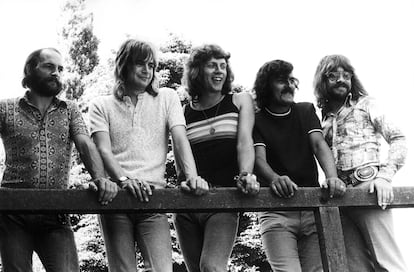John Lodge, bassist and one of the singers of the British rock band The Moody Blues, has died at the age of 82, according to his family this Friday in a statement cited by UK media. The family described Lodge as a “beloved husband, father, grandfather, father-in-law and brother,” and explained that he had been “taken away suddenly and unexpectedly.”
Born in Birmingham, Lodge joined The Moody Blues in 1966, two years after the group formed. With him, the band moved away from its original rhythm and blues roots to enter the realm of symphonic rock. In 1967 the group published their great success Nights in White Satin (known in Spain as Nights of white satin), where Lodge played bass and provided backing vocals. Lodge remained in the group until 2018, when the group stopped performing live after the retirement of Graeme Edge, the last original member. That same year, The Moody Blues were inducted into the Rock and Roll Hall of Fame.
The band is widely recognized for its pioneering role in progressive rock, especially for its innovative use of orchestral arrangements and the Mellotron, an electromechanical keyboard instrument that characterized its sound. “John left peacefully, surrounded by his loved ones and the sounds of The Everly Brothers and Buddy Holly,” the family statement added, referring to the musicians Lodge deeply admired.
Their 1967 album, Days of Future Passedis considered one of the first concept albums in history, fusing rock with classical music. From this work emerged one of the band’s greatest hits: Nights in White Satin. He was also part of iconic albums such as On the Threshold of a Dream (1969), A Question of Balance (1970) y Seventh Sojourn (1972), a stage in which The Moody Blues consolidated their influence within progressive rock.
Lodge’s family noted that the artist “was happiest when he was on stage.” In recent years, he had continued to perform with his son-in-law Jon Davison, current vocalist of Yes, and collaborated with his children Emily and Kristian. Lodge studied at the Birmingham College of Advanced Technology and married his wife Kirsten in 1968. They had two children, and one of the band’s most personal songs, Emily’s Songwas composed in honor of his daughter. The musician defined himself as an evangelical Christian and claimed that his faith had helped him stay away from the excesses of the rock world.

